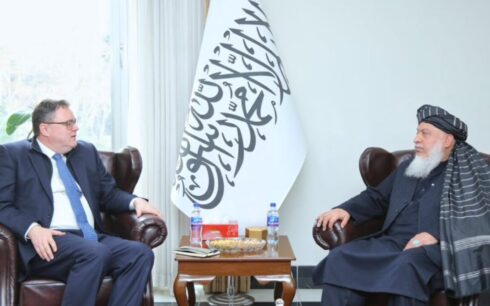The Taliban deputy chief minister Abdul Salam Hanafi said on Tuesday the Taliban must strengthen the education system in Afghanistan.
Speaking at a gathering at Kabul University, Hanafi stated that the Taliban must prove their claims of working for the development of the country by boosting Afghanistan’s educational system.
Hanafi’s remarks come almost two months after the group banned Afghan women from getting a university education.
“If we are claiming to do this and that; first we must enhance our educational system in terms of quantity and quality, if we do not update it, then we will never be able to make our homeland independent, which is the demand for the independence of the country,” Hanafi stated.
Without mentioning the ban on women’s education, he noted that the duty of a religious scholar is not to “forbid” education.
“Religious scholars have to enlighten the society about the importance of sciences that we can use to improve our society today and move from this state to a better state,” Hanafi added.
Taliban on December 20, 2022, ordered all private and public universities to suspend education for Afghan women “until further notice” and four days later the group also barred women from working for aid agencies across Afghanistan.
Four senior Taliban members, who are familiar with the matter, have told Amu TV that the group’s acting minister for hajj and religious affairs Noor Mohammad Saqib; acting justice minister Abdul Hakim Sharei; acting chief justice Sheikh Abdul Hakim; minister of propagation of virtue and the prevention of vice Khalid Hanafi; and chief minister Mullah Hassan Akhund, are among the key Taliban members who have insisted in the closure of universities for women.
According to the sources, Sirajuddin Haqqani, Taliban’s acting interior minister, and Mullah Yaqoob Mujahid, acting defense minister, are against their leader’s decision to ban women from education.
In his latest speech at the graduation ceremony of students of a religious school in Khost province on Saturday, Haqqani accused the Taliban leadership of a “monopolizing power.”
Without naming anyone, Sirajuddin Haqqani criticized the Taliban administration and said that “monopoly of power” and “imposing demands” on others are not beneficial to the Taliban government.
A number of experts, meanwhile, stated that Haqqani’s remarks show his opposition to the Taliban’s restrictions on women.
A day after Haqqani’s speech, the Taliban’s deputy justice minister Abdul Ghani Faiq also warned that if someone “is an Amir or an official or in the framework of the ministry” moves against the system cannot be forgiven.
The Taliban-designated governor for Kandahar Yusuf Wafa, in footage that circulated on social media, stated: “We gave sacrifice and fought for the Islamic system (Taliban) for twenty years. Now we have to sacrifice and implement the conditions.”
Nasim Modabir, the former representative of Baghlan in Afghanistan’s parliament, said that the recent statements of four Taliban officials means there are severe disputes among the group.
“The differences between the Taliban have historical roots. This group also had disputes over power and wealth. Haqqani wants to show himself as a good person by using the issue of women and girls’ education and politically using the issue of women. Let us not forget that this group carried out the biggest and most attacks,” Modabir added.
It has been 18 months since the Taliban took control of Afghanistan. Since then, the group has imposed a raft of restrictions against women and girls; first they closed schools for teenage girls above the sixth grade, then educational centers including universities and followed this up with a ban on women working for non-governmental organizations (NGOs).





